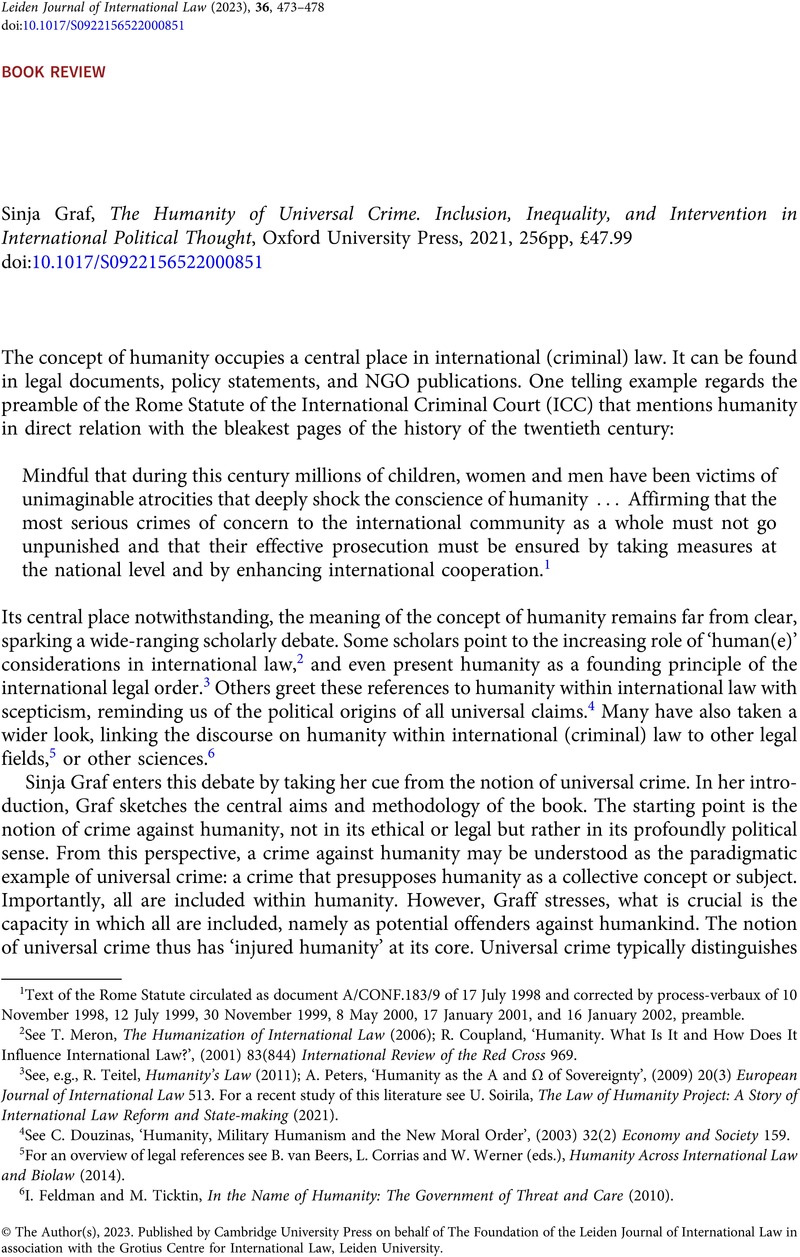No CrossRef data available.
Article contents
Sinja Graf , The Humanity of Universal Crime. Inclusion, Inequality, and Intervention in International Political Thought, Oxford University Press, 2021, 256pp, £47.99
Review products
Published online by Cambridge University Press: 15 February 2023
Abstract

- Type
- Book Review
- Information
- Copyright
- © The Author(s), 2023. Published by Cambridge University Press on behalf of The Foundation of the Leiden Journal of International Law in association with the Grotius Centre for International Law, Leiden University
Footnotes
Vrije Universiteit Amsterdam, Amsterdam, 1081 HV, The Netherlands [l.d.a.corrias@vu.nl].
References
1 Text of the Rome Statute circulated as document A/CONF.183/9 of 17 July 1998 and corrected by process-verbaux of 10 November 1998, 12 July 1999, 30 November 1999, 8 May 2000, 17 January 2001, and 16 January 2002, preamble.
2 See T. Meron, The Humanization of International Law (2006); R. Coupland, ‘Humanity. What Is It and How Does It Influence International Law?’, (2001) 83(844) International Review of the Red Cross 969.
3 See, e.g., R. Teitel, Humanity’s Law (2011); A. Peters, ‘Humanity as the A and Ω of Sovereignty’, (2009) 20(3) European Journal of International Law 513. For a recent study of this literature see U. Soirila, The Law of Humanity Project: A Story of International Law Reform and State-making (2021).
4 See C. Douzinas, ‘Humanity, Military Humanism and the New Moral Order’, (2003) 32(2) Economy and Society 159.
5 For an overview of legal references see B. van Beers, L. Corrias and W. Werner (eds.), Humanity Across International Law and Biolaw (2014).
6 I. Feldman and M. Ticktin, In the Name of Humanity: The Government of Threat and Care (2010).
7 On this concept see D. Luban, ‘The Enemy of All Humanity’, (2018) 2 Netherlands Journal of Legal Philosophy 112; L. Corrias and W. Veraart, ‘The Hostis Generis Humani: A Challenge to International Law’, (2018) 2 Netherlands Journal of Legal Philosophy 107.
8 S. Graf, The Humanity of Universal Crime. Inclusion, Inequality, and Intervention in International Political Thought (2021), at 36.
9 Ibid., at 37.
10 Ibid., at 47.
11 Ibid., at 52.
12 Ibid., at 51–2, 55–61.
13 Ibid., at 85.
14 J. Améry, At the Mind’s Limits: Contemplations by a Survivor on Auschwitz and its Realities (translated by S. Rosenfeld and S. P. Rosenfeld, 1980); P. Levi, Survival in Auschwitz: The Nazi Assault on Humanity (translated by S. Woolf, 1993). Note that the latter’s original Italian title – Se questo è un uomo – literally translates as ‘If this is a man’.
15 For an analysis of this case see L. Corrias, ‘Crimes Against Humanity, Dehumanization and Rehumanization: Reading the Case of Duch with Hannah Arendt’, (2016) 29 Canadian Journal of Law & Jurisprudence 351.
16 For a discussion of some of these dichotomies see T. Bouwknegt and B. Hola, ‘Dominic Ongwen: The ICC’s Poster and Problem Child’, Justice Info Blog, 16 March 2020, available at www.justiceinfo.net/en/44014-dominic-ongwen-icc-poster-and-problem-child.html; J. Stauffer, ‘Law, Politics, the Age of Responsibility, and the Problem of Child Soldiers’, (2016) 16(1) Law, Culture and the Humanities 42; M. A. Drumbl, ‘Victims Who Victimise’, (2016) 4(2) London Review of International Law 217.
17 See Graf, supra note 8, at 200–1, note 41.
18 Cf. L. D. A. Corrias and G. M. Gordon, ‘Judging in the Name of Humanity: International Criminal Tribunals and the Representation of a Global Public’, (2015) 13(1) Journal of International Criminal Justice 97. The opening statements of international prosecutors play a special role in this regard. For a thorough analysis see S. Stolk, The Opening Statement of the Prosecution in International Criminal Trials: A Solemn Tale of Horror (2021).
19 I am indebted to the work of H. Lindahl and B. van Roermund for this understanding of representation, see, e.g., H. Lindahl, Fault Lines of Globalization: Legal Order and the Politics of A-Legality (2013); H. Lindahl, Authority and the Globalisation of Inclusion and Exclusion (2018); B. Van Roermund, Legal Thought and Philosophy: What Legal Scholarship is About (2013); B. Van Roermund, Law in the First Person Plural: Roots, Concepts, Topics (2020).




